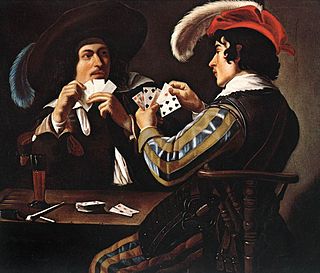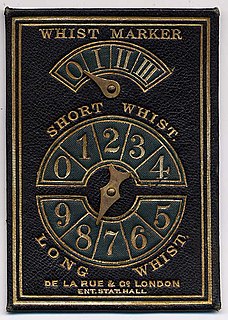Related Research Articles

Contract bridge, or simply bridge, is a trick-taking card game using a standard 52-card deck. In its basic format, it is played by four players in two competing partnerships, with partners sitting opposite each other around a table. Millions of people play bridge worldwide in clubs, tournaments, online and with friends at home, making it one of the world's most popular card games, particularly among seniors. The World Bridge Federation (WBF) is the governing body for international competitive bridge, with numerous other bodies governing bridge at the regional level.

A card game is any game using playing cards as the primary device with which the game is played, be they traditional or game-specific.
Oh Hell, Oh Pshaw or Nomination Whist is a trick-taking card game of British origin in which the object is to take exactly the number of tricks bid. Unlike contract bridge and spades, taking more tricks than bid is a fail. It was first described by B. C. Westall around 1930 and originally called Oh! Well. It was said to have been introduced into America via the New York clubs in 1931. It has been described as "one of the best round games."

A trick-taking game is a card or tile-based game in which play of a hand centers on a series of finite rounds or units of play, called tricks, which are each evaluated to determine a winner or taker of that trick. The object of such games then may be closely tied to the number of tricks taken, as in plain-trick games such as contract bridge, whist, and spades, or to the value of the cards contained in taken tricks, as in point-trick games such as Pinochle, the Tarot family, Briscola, and most evasion games like Hearts. Trick-and-draw games are trick-taking games in which the players can fill up their hands after each trick. In most variants, players are free to play any card into a trick in the first phase of the game, but must follow suit as soon as the stock is depleted. Trick-avoidance games like Reversis or Polignac are those in which the aim is to avoid taking some or all tricks.

Whist is a classic English trick-taking card game which was widely played in the 18th and 19th centuries. Although the rules are simple, there is scope for strategic play.

The card game auction bridge was the third step in the evolution of the general game of bridge. It was developed from bridge whist in 1904, possibly by 1900. Auction bridge was the precursor to contract bridge. Its predecessors were whist and bridge whist.

Solo Whist, sometimes known as English Solo or simply Solo, is a trick-taking card game for four players. Despite the name it is not related to Whist, but derives from an early form of Boston played in the Low Countries, whose direct ancestor, in turn, was the 17th-century Spanish game of Ombre. Its major distinctive feature is that one player often plays against the other three. However, players form temporary alliances with two players playing against the other two if "Prop and Cop" is the current bid. It requires four players using a standard 52 card deck with no jokers. Aces are high and the deal, bidding and play are clockwise.

Duplicate bridge is the most widely used variation of contract bridge in club and tournament play. It is called duplicate because the same bridge deal is played at each table and scoring is based on relative performance. In this way, every hand, whether strong or weak, is played in competition with others playing identical cards, and the element of skill is heightened while that of chance is reduced. Duplicate bridge stands in contrast to rubber bridge where each hand is freshly dealt and where scores may be more affected by chance in the short run.

In duplicate bridge, a board is an item of equipment that holds one deal, or one deck of 52 cards distributed in four hands of 13 cards each. The design permits the entire deal of four hands to be passed, carried or stacked securely with the cards hidden from view in four pockets. This is required for duplicate bridge tournaments, where the same deal is played several times and so the composition of each hand must be preserved during and after each play of each deal.

Preferans or Russian Preference is a 10-card plain-trick game with bidding, played by three or four players with a 32-card Piquet deck. It is a sophisticated variant of the Austrian game Préférence, which in turn descends from Spanish Ombre and French Boston. It is renowned in the card game world for its many complicated rules and insistence on strategical approaches.
Vint is a Russian card-game, similar to both bridge and whist and it is sometimes referred to as Russian whist. Vint means a screw in Russian, and the name is given to the game because the four players, each in turn, propose, bid and overbid each other until one, having bid higher than the others care to follow, makes the trump, and his vis-a-vis plays as his partner.
The Bath coup is a coup in the game of contract bridge in which the declarer, who holds AJx(x) in a suit, ducks the left-hand opponent's lead of a king in that suit. The coup is presumed to be named after the city of Bath in England and dates from the game of whist, the predecessor of bridge.

Robert Frederick Foster of New York City, known as R. F. Foster, was a memory training promoter and the prolific writer of more than 50 nonfiction books. He wrote primarily on the rules of play and methods for successful play of card, dice, and board games. Alan Truscott wrote 20 years after his death that Foster "had been one of the great figures in whist and bridge" for 60 years.

Milton Cooper Work was an American authority on whist, bridge whist, auction and contract bridge. At least during the 19th century he was a cricket player, writer, and official.
A trump is a playing card which is elevated above its usual rank in trick-taking games. Typically, an entire suit is nominated as a trump suit; these cards then outrank all cards of plain (non-trump) suits. In other contexts, the terms trump card or to trump refers to any sort of action, authority, or policy which automatically prevails over all others.
Eralash or Yeralash is a Russian trick-taking card game that is similar to whist. The Russian word "Eralash" means "jumble".
The history of contract bridge, one of the world's most popular partnership card games, may be dated from the early 16th-century invention of trick-taking games such as whist. Bridge departed from whist with the creation of Biritch in the 19th century, and evolved through the late 19th and early 20th centuries to form the present game.
Shelem, also called Rok or similar, is an Iranian trick-taking card game with four players in two partnerships, bidding and competing against each other. Bidding and trump are declared in every hand by the bidding winner. Both the name and the point structure of this game are similar to the American game Rook, there being a possible connection between the two games, although it is not clear as from which game it derives.

Boston is an 18th-century, trick-taking, card game played throughout the Western world apart from Britain, forming an evolutionary link between Hombre and Solo Whist. Apparently named after a key location in the American War of Independence, it is probably a French game which was devised in France in the 1770s, combining the 52-card pack and logical ranking system of partnership Whist with a range of solo and alliance bids borrowed from Quadrille. Other lines of descent and hybridization produced the games of Twenty-five, Préférence and Skat. Its most common form is known as Boston de Fontainebleau or French Boston.
References
- ↑ The Encyclopedia Americana Grolier Academic Reference (1994) ISBN 0-7172-0125-2
- ↑ "Project Gutenberg". Project Gutenberg.